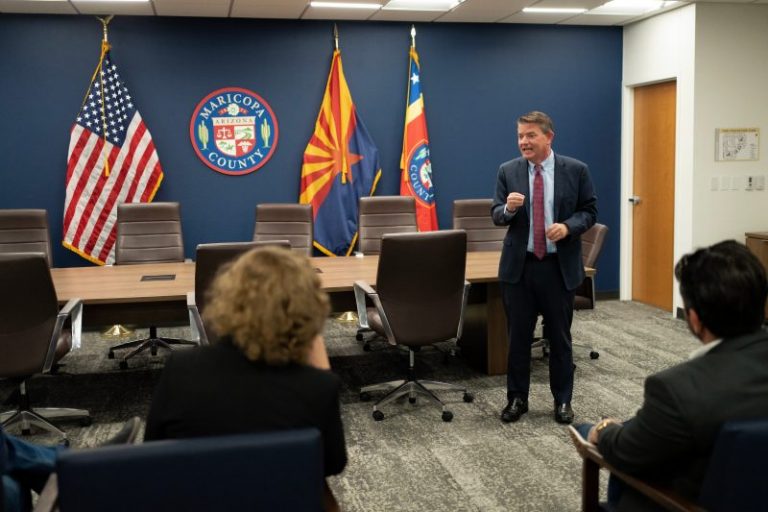PHOENIX — After facing an onslaught of harassment and violent threats for certifying the results of the 2020 election, a Republican on the governing board of Arizona’s largest county will not seek reelection during the 2024 cycle.
Bill Gates, a longtime conservative and Harvard-educated attorney, told The Washington Post that he intends to serve his term through the end of 2024 and carry out the election-related duties that come with it. In an interview and prepared statement, he said he was proud of his time in office and thanked county workers.
“At Maricopa County, I kept government lean, taxes low, supported our most vulnerable residents, and told the truth about our elections in the face of false information,” his statement said. “My will to fight for the truth remains unhindered, and I look forward to Maricopa County running the 2024 election.”
He did not directly cite the prolonged attacks against him, his wife and three daughters as the basis for his decision to not pursue another four-year term to represent the county. The threats, doxing and online harassment that began during the pandemic and continue today have at times prompted him and his family to flee their home.
In May 2021, Gates sought professional help from a therapist and, soon after, learned he was experiencing post-traumatic stress disorder, triggered by the strain of his public fight against falsehoods about the county’s election-related work.
“I’m at peace with this,” he told The Post. “And we’re at peace with this as a family.”
Gates’s departure after serving two full terms on the board reflects the dominance of the election-denying movement in Arizona, led by Republican Kari Lake. The former gubernatorial candidate, who was backed by former president Donald Trump, lost her 2022 general election to Democrat Katie Hobbs. She continues to blame county leaders for her narrow loss last year and has spread misinformation about them. Lake has failed to prove her assertions in court.
Some printers at some voting locations in Maricopa County malfunctioned during the 2022 midterm election, again bringing scrutiny on the county. An independent review concluded that while some voters were inconvenienced, no one was deprived of the right to vote.
Gates’s decision also adds a high-profile name to the exodus of local election officers across the nation who have left their posts or have passed on reelection campaigns amid attacks. Inspired by Trump, many GOP candidates and activists in Arizona have spent years undermining confidence in voting systems by parroting baseless conspiracy theories and manufacturing their own.
All five members of the county board are up for reelection in 2024. The three other Republicans — all moderates — could face primary fights from the right, should they decide to seek reelection.
After last year’s midterm elections, some GOP activists clamored to recall Gates, but it is unclear how successful the signature-gathering efforts have been. A previous effort to recall him and other supervisors over their support of a pandemic-era mask mandate and their approval of the 2020 election results failed.
Gates began his political career in 2009 when he won an appointment to the Phoenix City Council after running election-integrity operations for the state Republican Party. Though he bemoans the toxic political environment and the divisiveness within his party, he hinted at a desire to remain in politics.
Asked whether he was eying a different elected post, he replied: “At this point, I’m not ruling anything out. I’m most interested in this current job and getting through 2024.”
As he helps the county prepare for another election, Gates wants stronger protections for election officials and more federal funding to help them recruit and train poll workers, bolster cybersecurity measures, install security cameras and more. He is joining a bipartisan group of election workers in D.C. next week to urge the White House, members of Congress, the Justice Department and the Department of Homeland Security to advocate for the funding and protections as part of an effort by Issue One, an organization that advocates for issues of democracy and more regulation of money in politics.

